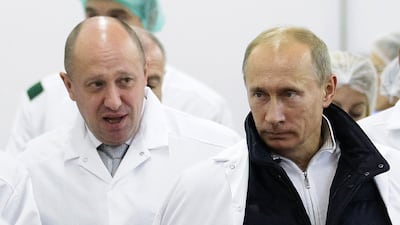Live updates: follow the latest news on Russia-Ukraine
War in Ukraine has decimated the ranks of the nearly 8,000 mercenaries from the Wagner Group deployed by Russia to the conflict in Ukraine, according to experts speaking in the UK parliament.
Giving evidence to the Commons Foreign Affairs Committee, Christo Grozev, executive director of the Bellingcat investigative website, said 3,000 members of the private military company were thought to have been killed on the battlefield.
He said sources within the group — the largest of three mercenary groups involved in the conflict — had told them that the numbers fighting alongside Russian forces had been “much higher” than had been expected.
They included 200 personnel sent to Kyiv before the conflict in a failed mission to “scout out and assassinate” political figures, while a “large number” were deployed with convoys which advanced on the capital from Belarus.
He said they had also been present in Bucha, where some of the worst evidence of alleged war crimes had been discovered.
Mr Grozev said they had been told by one former group member that some chose to fight because they enjoyed killing.
“He said that about 10 to 15 per cent are sociopaths, people who go there just because they want to kill. They are bloodthirsty, they are not just adrenalin junkies,” he told the committee.
Dr Sean McFate, a senior fellow at the Atlantic Council think tank and professor at the US National Defence University, said the group’s brutality in the conflicts such as the Syrian civil war was “part of their selling point” as far as Russian President Vladimir Putin was concerned.
“If you look at Bucha and others, there is the same pattern you saw in Syria, where they would interrogate, torture and behead people,” he said.
“One reason I think it has become one of Putin’s weapons of choice is it allows some plausible deniability between excesses on the ground, failures on the ground, and policy.”
However, Dr McFate said that to date western countries had not taken the threat of the group very seriously, and had not tracked the movements of its members.
“This has emboldened them [Russia] to use this as a stratagem for national expansion, national interests,” he said.
“We have not done a good enough job in tracking them. We see them as cheap Hollywood villains, but in fact they are not.”

Mr Grozev said that while imposing more sanctions on the group’s head, Yevgeny Prigozhin, known as “Putin’s chef”, would have little impact, it may be more effective targeting individual group members who like to holiday abroad with their families.
“The knowledge that they do is a cause of ridicule about western sanctions because this spreads through the rumour mill,” he said.
“So stopping all of these people being able to travel internationally, at least to the western world, might be much, much bigger than slapping one more sanction on Prigozhin.”



































